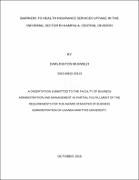| dc.description.abstract | Health insurance services have been proposed as one of the strategies to protect the insured client from out of pocket payments that continue to hinder millions of people from accessing healthcare services. Out of pocket payments not only hinder access to healthcare but also caused financial catastrophe to some families and individuals as theystrive to access the much needed healthcare. Despite the potential benefits and the availability of health insurance services in Uganda, the uptake of the services in still limited, particularly in the informal sector that compromises the biggest part of the population. The purpose of this research was to examine the relationship between knowledge, attitude, and financial barriers and the uptake of health insurance services in the informal sector in Central division, Kampala City. The study was guided by the following specific objectives: a) To analyze the relationship between knowledge barriers and health insurance services uptake in the informal sector. b) To examine the relationship between attitude barriers and health insurance services uptake in the informal sector. c) To analyze the relationship between financial barriers and health insurance services uptake in the informal sector. The study adopted a case study design, incorporating both qualitative and quantitative approaches. The data collection tool was a questionnaire with both quantitative and qualitative items. The study used purposive followed by simple random selection to obtain 175 respondents in the informal sector in Central Division. Of these, 137respondents returned fully filled questionnaires. The data obtained was analyzed using Statistical Package for the Social Sciences (SPSS). Quantitative data was analyzed using descriptive statistics of frequencies, percentages and mean. Qualitative data was presented thematically as quotations. The study found out that there was a positive strong correlation between knowledge barriers and the uptake of health insurance services, r (135) = .0773, p≤0.00. There is a positive correlation between financial barriers and the uptake of health insurance services, r (135) =0.473, p≤0.00 A multiple regression analysis showed that knowledge, attitude and financial barriers explain 63.4%, R square = .643. Knowledge and financial barriers are influential predictors of uptake of health insurance services. (Beta = .602, t-test = 7.530), (Beta = .220, t-test = 3.940) respectively. Attitude barriers were not an influential predictor of health insurance services uptake. (Beta = .116) The study concluded that the uptake of health insurance services is negatively affected by knowledge gaps, and the uncertain financial situation of the informal sector.
The study recommends that the key stakeholders should improve the flow of information to the informal sector to cover the knowledge gaps as one of the strategies to improve health insurance services uptake. Insurance companies should also provide flexible premium payment terms to suit the informal sector. | en_US |


